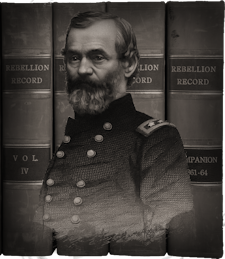To Mrs. Lyon
Cairo, Sunday, Feb. 9, 1862.—Since writing to you there has been a battle and victory at Fort Henry, on the Tennessee river. The battle was fought on our side by the gunboats, our infantry taking no part in It. We are not stationed here permanently. We were only left because we had not our blue uniforms.[1] We have them now. But for this we should doubtless have been at Fort Henry. The boys are much disappointed. We may go there yet, as regiments are constantly going up there. I suppose they will have another fight in a few days on the Cumberland river about fourteen miles east of Fort Henry, at Fort Donelson, but we have no orders as yet.
I have been for the last two days acting as President of a Regimental Court Martial for the trial of minor offenses. There were twelve cases before us. It takes a good deal of evidence in my court to convict.
[1] When the soldiers enlisted, gray uniforms were furnished by the State. This caused confusion because the Confederates also wore gray uniforms—hence the change.











